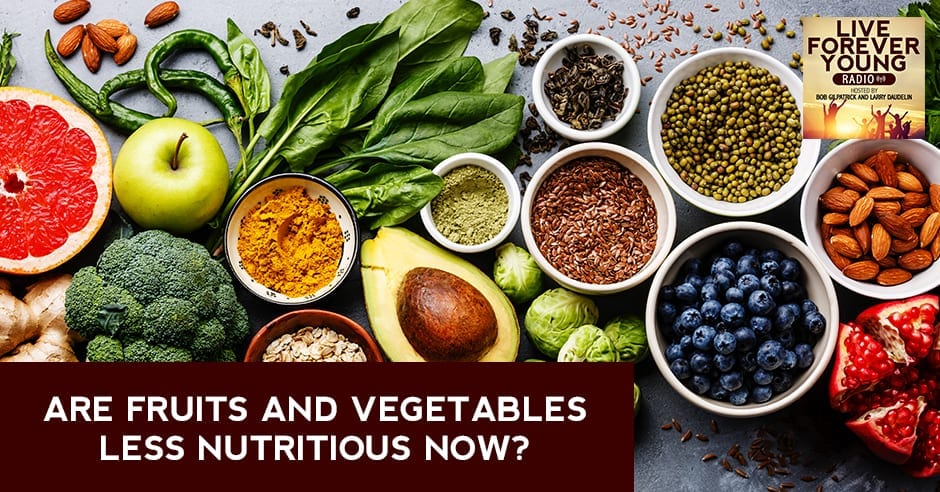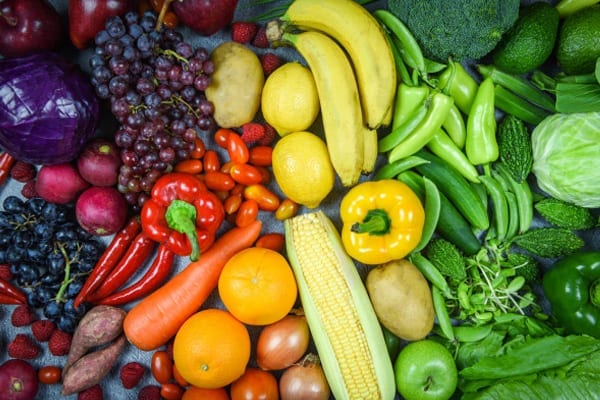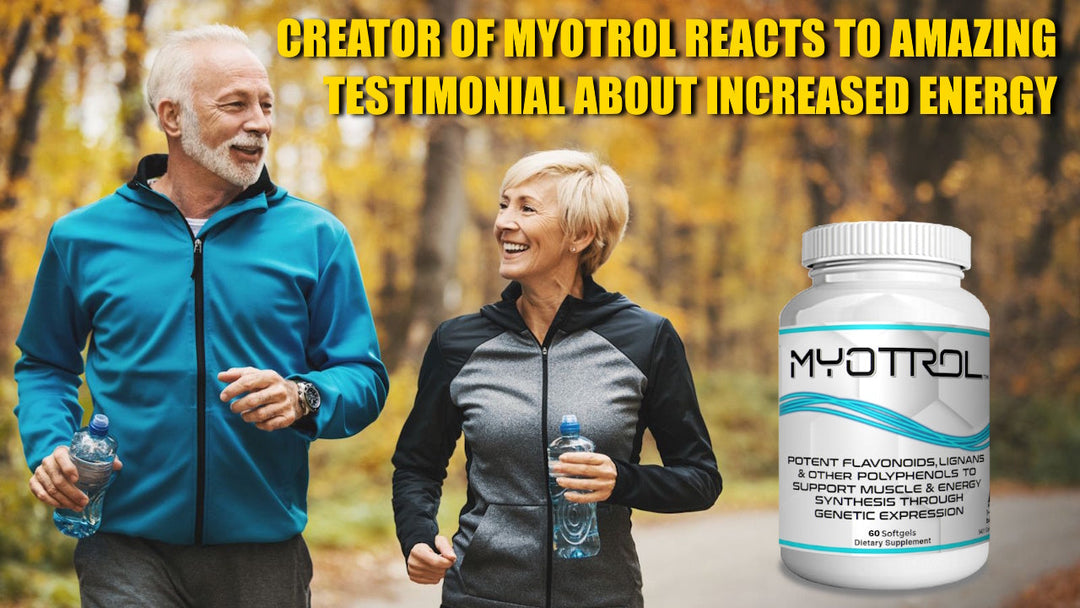Are Fruits and Vegetables Less Nutritious Now?

Millions of Americans are nutrient-deficient and don't even know it, which leads us to the question: Are fruits and vegetables less nutritious now, than before? If so, are nutritional supplements necessary? How do we do supplementation correctly? On this episode of Live Forever Young Radio, hosts Bob Gilpatrick and Larry Daudelin and producer, Rollie Culp answer these questions. As a Certified Holistic Nutritionist, Bob also shares the things you can do to figure out if you are one of the millions of Americans missing vital nutrients from their diet, as well as easy ways to supplement what you are missing.
Watch the podcast here
Listen to the podcast here
[fusebox_track_player url="https://feeds.podetize.com/ep/tejtzt7KV/media" title="Are Fruits and Vegetables Less Nutritious Now?" social_linkedin="true" social_pinterest="true" social_email="true" ]
Are Fruits and Vegetables Less Nutritious Now?
Are Nutritional Supplements Necessary?
This time on the show, we will answer the question, are fruits and vegetables less nutritious now than before? Certified Holistic Nutritionist Bob Gilpatrick will share things you can do to figure out if you are one of the millions of Americans missing vital nutrients from their diet, as well as some easy ways to supplement what you're missing. Sit back, relax, and get ready to live forever young.
Welcome, everyone to the show. I'm Bob, I'm here with Larry Daudelin and Rollie Culp.
One of the things that I appreciate is the fact that we get a lot of people that call in with different questions and stuff. We try to help them here at the office. We try to take some of the important ones and we try to make a topic out of it. Rollie, what's the first question we have that's most important?
The one that we got is we were getting ready to do a show about it. When the question came in, it made sense to start the show with that. It comes from Mary from Texas. In Texas, they do a lot of planting and agriculture. She asks, “Are fruits and vegetables less nutritious than before?” What she means than before, I would assume that she's talking before industrialized agriculture and mass production of stocks.
I don't even think we need to clarify it. We know that it isn't as nutritious as it used to be. The soil is depleted. Bob, do you have any stocks on the soil?
It's very interesting that the question came from Texas because the major study that's been done on the level of nutritious vegetables is done in Texas. The University of Texas did the main study and they looked back over the course of many years at the quality of the soil. They're able to measure what's been going on. For many years, there has been a steady decline. You have the soil deficiency now that has culminated in a result where people will go to the grocery store to buy fruits and vegetables. There's almost no nutrition left in those fruits and vegetables. A lot of times, people also are eating processed foods so the fruits and vegetables have been processed with enzymes added and frozen. They've had coloring added to it and the way they've been cooked has created trans fats. This is causing a lot of problems with people's diet.
You said the study showed that it's been declining. What was declining in the study?
The quality and the number of nutrients in the soil have been steadily going down. The plants receive nutrition in the form of minerals from the soil. Plants can still grow when there's little nutrition in the soil because plants get most of the energy that makes them grow from the air. You have bacteria that clings to the leaves and the grass. That bacteria is extracting nitrogen from the air that's making the plant grow. You can have a plant that's all grown up because of the nitrogen from the air but the soil quality was poor that it has no nutritional value.
Now, you'll see a lot of different doctors and farmers that talk about SBO, Soil-Based Organism.

The depleted soil is not only depleted of minerals, but it's also depleted of the soil-based organisms, the good bacteria and it's deeply of the worms. The roots are thin and shreddy. That's what's going on. We have to consider that that's a fact and you're not going to get the nutrition that you need. The famous TV doctor said that only 5% of the people in the United States can get all of the nutrition they need from food alone. These are people that either lives on their own organic farm or they have access continuously year-round to organic fruits and vegetables. If the organic farm is a good organic farm, you can get all of your nutrition.
Unfortunately, you have to eat a basket full of things to get all the nutrition that you need. What we believe, we need to supplement what you can't get at the store because of the soil. If you don't supplement, you're not going to be able to get it.
There's another question that relates to this that we got. It comes from Jim in Florida. Based on where we were going, he was wondering because of this type of stuff, “Are nutritional supplements necessary to have robust health? If they are necessary, what's something that you guys would suggest?”
It's a good question because so much of people's lives are dependent on how healthy they are. If people are not feeling healthy, if they're feeling rundown or sick because they don't have proper nutrition, they're generally not going to be happy. What we notice is when people do get well-nourished, they start to feel happier. It's like, “I feel more energy. I'm bouncing out of bed and bounding up the stairs. I'm doing better.” As a result, they’re like, “I feel happy.” When people feel happy, they tend to feel grateful.
They start to notice things that they're grateful for. “I'm happy. Look how beautiful the trees are. I'm happy to be with my children.” Good nutrition is more than like, “Now I know I've got enough Vitamin B.” It leads to a different type of life. People need to understand the concept of foundational nutrition because the average person that wants to supplement with nutritional supplements will buy some stuff online. They'll go to the drug and health food store. They’ll ask somebody stocking the health food store aisle, “What should I do? I feel this.” They'll get a little of this and little of that. The next thing you know, they have twenty bottles of vitamin pills.
Do you know what I call it?
What?
I call that supplement confusion.
It's expensive. Each of those bottles cost between $20 and $30 and you got twenty of them, think about it. It's a hassle. You're unlikely to use it every day. Not only that, I can guarantee you, it's not in the right ratios. Ratios are important. You need a certain amount of this Vitamin to interact with the amount of this Vitamin. You have to identify a place where you can get true foundational nutrition that's comprehensive that includes all the things you need in the right ratio.
Is it true that even if you did, as Larry was saying, you eat a bunch of organic carrots and you do eat great food, there's still going to be gaps in there because you're not going to get everything from food, right?
Technically, you can but it's difficult because there are all different types of essential amino acids, proteins that you need, etc. It's unlikely that you'd be able to eat enough different foods to be as healthy as you possibly can. This is why when you look at foundational nutrition, you want to have macronutrients which are proteins, preferably in the form of amino acids, which are digested proteins and good fats. Good fats that are in the form of mid-chain triglycerides, etc., and low-glycemic-index carbohydrates.
Carbohydrates can be fast-burning like bread or they can be absorbed and burned slowly. Things like vegetables such as broccoli and spinach. This gives you a more constant source of energy. That’s the beginning. Those are called macronutrients. From there, you need the micronutrients that help all of that get converted into energy. You have to have vitamins, minerals, and coenzymes that all work together to create this energy that you need. Energy is created in your mitochondria, in the Krebs cycle. We know the exact details right down to the electron exactly how food gets converted into ATP which is your molecule of energy.
It's fairly complex. We have taken the guesswork out of it. We have come up with a product that we think is foundational nutrition. This is something that everybody should be aware of because when you were talking earlier and you said, “I'm not feeling good. I'm not as happy as I would. Psychologically, I feel a little depressed.” Depression is a big thing. Depression and nutrition go hand-in-hand. It doesn't happen in one day. All of a sudden, they're not eating right for a while.
Do you know what that leads to? You’re right. Well-fed but malnourished. You have food but they’re not nourishing.
This is why people are gaining weight because, where do I go? They first go to sugars. That's the first place that they go to because it's instant gratification, “I feel better when I have a piece of chocolate.” There's nothing wrong with chocolate as long as it’s dark chocolate with a high percentage. “I'm going to go get this burger real quick with some fries because they said I should have fries as part of the meal.”
Those are high-glycemic-index carbohydrates with trans fats. The worst food that you can eat.
It's self-gratification at that time. You're feeling, “I feel good now,” but an hour and a half later, I'm hungry because your body knows that this is not what it needs.
Temporary food is what it is. It’s not even food.
Unfortunately, in this life, it's quick and easy and that's the best that they can do. Choose for yourself. People are smart.
Another question came in. It comes from Mike from Arizona. He says, “To stay active and healthy, what would you guys suggest are some basic supplements that I can use?”
The foundational nutrition no longer requires twenty bottles of vitamin pills to get everything you need for foundational nutrition. It's better that you don't get it from all those pills. You should get it in powder form. In our total health system, which is foundational nutrition, there's a product that has 70 different nutrients in it. It is designed to cover this foundation. There’s another product that is made from sprouted barley seeds that come from these pristine organic farms up in Canada that have great soil quality. That helps potentiate the product with the 70 nutrients in it. It helps to cleanse your intestines so that you can absorb your nutrients better.
It also has antioxidants in it to keep your inflammation down. When people do this, they also need a form of probiotic. Believe it or not, our bodies are only 1/10th human and we are 90% other than human. Meaning, we are bacteria, viruses, funguses, etc. You need to tend to your microbiome as well when you're talking about foundational nutrition, otherwise, you're missing 90% or above. The other thing is this, almost everyone in the United States for certain is depleted in Vitamin D3 because we were taught not to go out in the sun too much because you're going to get skin cancer.
I got a stat on that. They estimate that over one billion people in the world are deficient in D3.
Some doctors and scientists believe that Vitamin D3 is the single most important nutrient. It does many different things. It helps your immune system. In addition, it helps to stimulate your genetic expression that allows your body to produce all the proteins that it needs that are coded for in your DNA. Most people need to take between 5,000 and 10,000 IUs of Vitamin D.
It’s one thing that you want to do because it does vary from person-to-person and geographically. If you get a lot of suns, you might not need as much supplementation. You want to get it tested. That's fairly easy. What's the name of the actual test? I think it’s 25(OH)D.
Yes. If you ask your doctor for a Vitamin D3 tests, they'll do that for you. If you don't ask, they’ll not go to do it. You want your level not to be at the low-end of the range. The low-end of the range is twenty. Some people will say, “If you're at fifteen, you're okay.” It's not true. You want your level to be up higher than that or above 50. This is one of the things that's an overall marker of your health. When you look at the health of someone by doing blood tests, you need to know their Vitamin D3 level because it's associated with many important aspects of good health.
Vitamin D3 has been around forever. It used to be a hot talking point then it went away. It's the big talking point again because nutritional doctors have realized how important it is. I'm on Medicare and I went and got my results tested. My D3 level was almost 80. My doctor looked at me and he said, “I wished everybody was right around your range. People don't understand how important it is.”

You have to be taking the supplement so that you can get it. What happens if I don't take my supplement? I'll tell you a weird story. I went on vacation. I was gone for five days. I left, unfortunately, the little kit that I put together, all my vitamins on a daily basis. I have them Monday through Saturday. We looked at the thing. I set it out. I forgot to take it. I thought, “I'll be fine because I have a lot of nutrition in me already.” About the third day, I was tired and I was groggy. I thought, “What is wrong?” I thought, “I didn't have my nutrition.”
Do you know what they say? Nutritional supplements only work if you do them every day because you're going to use that nutrition up as you go through everyday life.
Your body gets accustomed to getting it. It's saying, “Where're my nutrients?”
That means there are many things that good nutrition does for you. One of them is detoxification. You have to realize humans are gelatinous. We absorb toxins through our skin, breath, food, and water. By the time you get aged, your body can be very toxic. Good nutrition that contains detoxifying agents can give you a fresh start so you can detoxify and then you don't have the danger of getting adult-onset problems that are caused by toxicity. The other thing is the whole issue of generating energy. You want to have enough energy because that implies you're producing enough energy in your mitochondria and every other metabolic pathway requires this energy that's being created.
Many things improve and we see testimonials all the time will people say, “I started on the Total Health System and my skin started looking better. I have more energy.” Good nutrition also slows your rate of aging. People on average live to be about 78 to 80 years old with 85 being the median maximum lifespan. Even if you never get sick, by the age of 85, you're going to die of old age. With the right nutrition supplements, that's not the case. You can slow your rate of aging and you can measure how fast you are aging by looking at another blood test that you want to get with your Vitamin D3. It’s called CRP. This is a measure of your inflammation which tells you how fast you’re aging. The life insurance companies use it to determine how old they think you are biological versus chronologically.
You have to ask for that one too. Your doctor is not going to give it to you.
The average person's number is three on the scale. At age 85, you're going to be at your maximum lifespan even if you never get sick which is unlikely because if your inflammation is that high, you're going to get some type of problem. We measure Larry’s CRP all the time by using the foundational nutrition system. His inflammation went down by a factor of ten, not 10%. The average person is 3, Larry is 0.3. He's aging at a 10th the rate that he otherwise would be.
When we started this years ago, my numbers were unbelievably bad. This is why we're doing this, folks. This is why we decided to go ahead and even start this program and have these products that we have to have. I'm 75, when I was 65, I looked 75. I'm living proof. With all the energy I have and everything that I do, this is something that's very important if you're not feeling yourself. Sometimes people forget about how they used to feel. They think the way they feel now is normal. It's normal for you but if you want to feel better, think back 10 or 20 years ago. “I used to be able to go up these stairs, now I'm a little slower at it. I used to go for a little hike, I don't do that anymore. I rode a bike but now I'm a little wobbly.” If you want to go back to what you used to do, what you need is foundational nutrition.
One last thing, Larry. We're coming to the end here. We did a previous show on the issue of circulation. Good nutrition also helps with your circulation. It's one thing to have enough nutrients in your blood but it needs to get circulated all the way to the end of your feet, toes, and brain in order to be absorbed into your cells. The oxygen also is circulating in your blood. A good foundation on nutrition assures that you're going to continue to have good circulation as well.
If you go to LiveForeverYoungRadio.com, that'll link you to a lot of different products that we offer. The information itself is invaluable. It'll link you also to any questions that you might have. Go ahead and put your comments in.
Leave us some questions. That's how we did the show.
This is what provoked this show. Bob, thank you.
Thank you, Larry. Thanks, everybody for reading. We'll see you on the next one.
Important Links:
- Bob Gilpatrick
- Circulation - Previous Episode






Leave a comment